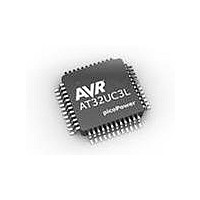AT32UC3L032-D3UR Atmel, AT32UC3L032-D3UR Datasheet - Page 736

AT32UC3L032-D3UR
Manufacturer Part Number
AT32UC3L032-D3UR
Description
MCU AVR32 32KB FLASH 48TLLGA
Manufacturer
Atmel
Series
AVR®32 UC3r
Datasheet
1.AT32UC3L-EK.pdf
(858 pages)
Specifications of AT32UC3L032-D3UR
Core Processor
AVR
Core Size
32-Bit
Speed
50MHz
Connectivity
I²C, SPI, UART/USART
Peripherals
Brown-out Detect/Reset, DMA, PWM, WDT
Number Of I /o
36
Program Memory Size
32KB (32K x 8)
Program Memory Type
FLASH
Ram Size
16K x 8
Voltage - Supply (vcc/vdd)
1.62 V ~ 3.6 V
Data Converters
A/D 9x10b
Oscillator Type
Internal
Operating Temperature
-40°C ~ 85°C
Package / Case
48-TLLGA
Processor Series
AT32UC3x
Core
AVR32
Data Bus Width
32 bit
Data Ram Size
16 KB
Interface Type
SPI, TWI, USART
Maximum Clock Frequency
50 MHz
Number Of Programmable I/os
36
Number Of Timers
7
Maximum Operating Temperature
+ 85 C
Mounting Style
SMD/SMT
3rd Party Development Tools
EWAVR32, EWAVR32-BL
Development Tools By Supplier
AT32UC3L-EK
Minimum Operating Temperature
- 40 C
On-chip Adc
10 bit, 9 Channel
Lead Free Status / RoHS Status
Lead free / RoHS Compliant
Eeprom Size
-
Lead Free Status / Rohs Status
Details
- Current page: 736 of 858
- Download datasheet (13Mb)
31.3.7.1
31.3.7.2
31.3.8
32099F–11/2010
AUX-based Debug Features
Cyclic Redundancy Check (CRC)
NanoTrace
The MSU can be used to automatically calculate the CRC of a block of data in memory. The
MSU will then read out each word in the specified memory block and report the CRC32-value in
an MSU register.
The MSU additionally supports NanoTrace. This is a 32-bit AVR-specific feature, in which trace
data is output to memory instead of the AUX port. This allows the trace data to be extracted by
the debugger through the SAB, enabling trace features for aWire- or JTAG-based debuggers.
The user must write MSU registers to configure the address and size of the memory block to be
used for NanoTrace. The NanoTrace buffer can be anywhere in the physical address range,
including internal and external RAM, through an EBI, if present. This area may not be used by
the application running on the CPU.
Utilizing the Auxiliary (AUX) port gives access to a wide range of advanced debug features. Of
prime importance are the trace features, which allow an external debugger to receive continuous
information on the program execution in the CPU. Additionally, Event In and Event Out pins
allow external events to be correlated with the program flow.
Debug tools utilizing the AUX port should connect to the device through a Nexus-compliant Mic-
tor-38 connector, as described in the AVR32UC Technical Reference manual. This connector
includes the JTAG signals and the RESET_N pin, giving full access to the programming and
debug features in the device.
AT32UC3L016/32/64
736
Related parts for AT32UC3L032-D3UR
Image
Part Number
Description
Manufacturer
Datasheet
Request
R

Part Number:
Description:
KIT DEV/EVAL FOR AT32UC3L0
Manufacturer:
Atmel
Datasheet:

Part Number:
Description:
DEV KIT FOR AVR/AVR32
Manufacturer:
Atmel
Datasheet:

Part Number:
Description:
INTERVAL AND WIPE/WASH WIPER CONTROL IC WITH DELAY
Manufacturer:
ATMEL Corporation
Datasheet:

Part Number:
Description:
Low-Voltage Voice-Switched IC for Hands-Free Operation
Manufacturer:
ATMEL Corporation
Datasheet:

Part Number:
Description:
MONOLITHIC INTEGRATED FEATUREPHONE CIRCUIT
Manufacturer:
ATMEL Corporation
Datasheet:

Part Number:
Description:
AM-FM Receiver IC U4255BM-M
Manufacturer:
ATMEL Corporation
Datasheet:

Part Number:
Description:
Monolithic Integrated Feature Phone Circuit
Manufacturer:
ATMEL Corporation
Datasheet:

Part Number:
Description:
Multistandard Video-IF and Quasi Parallel Sound Processing
Manufacturer:
ATMEL Corporation
Datasheet:

Part Number:
Description:
High-performance EE PLD
Manufacturer:
ATMEL Corporation
Datasheet:

Part Number:
Description:
8-bit Flash Microcontroller
Manufacturer:
ATMEL Corporation
Datasheet:

Part Number:
Description:
2-Wire Serial EEPROM
Manufacturer:
ATMEL Corporation
Datasheet:










